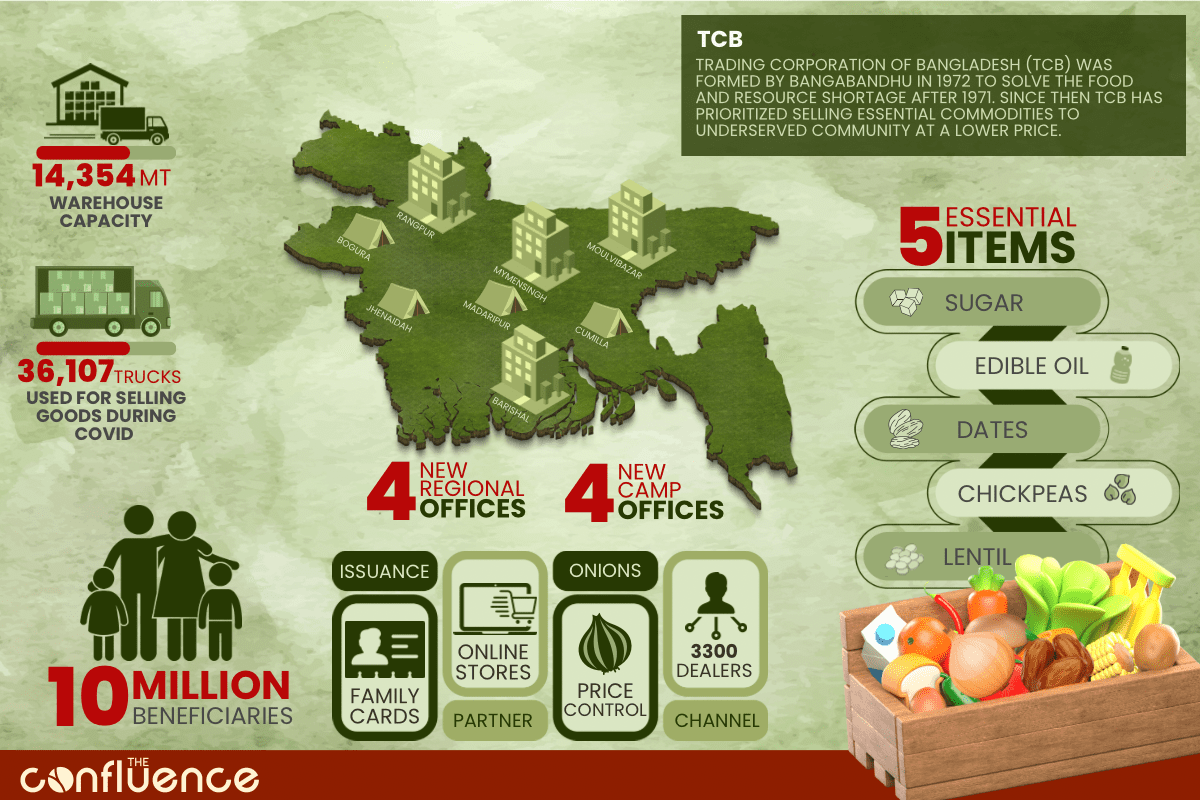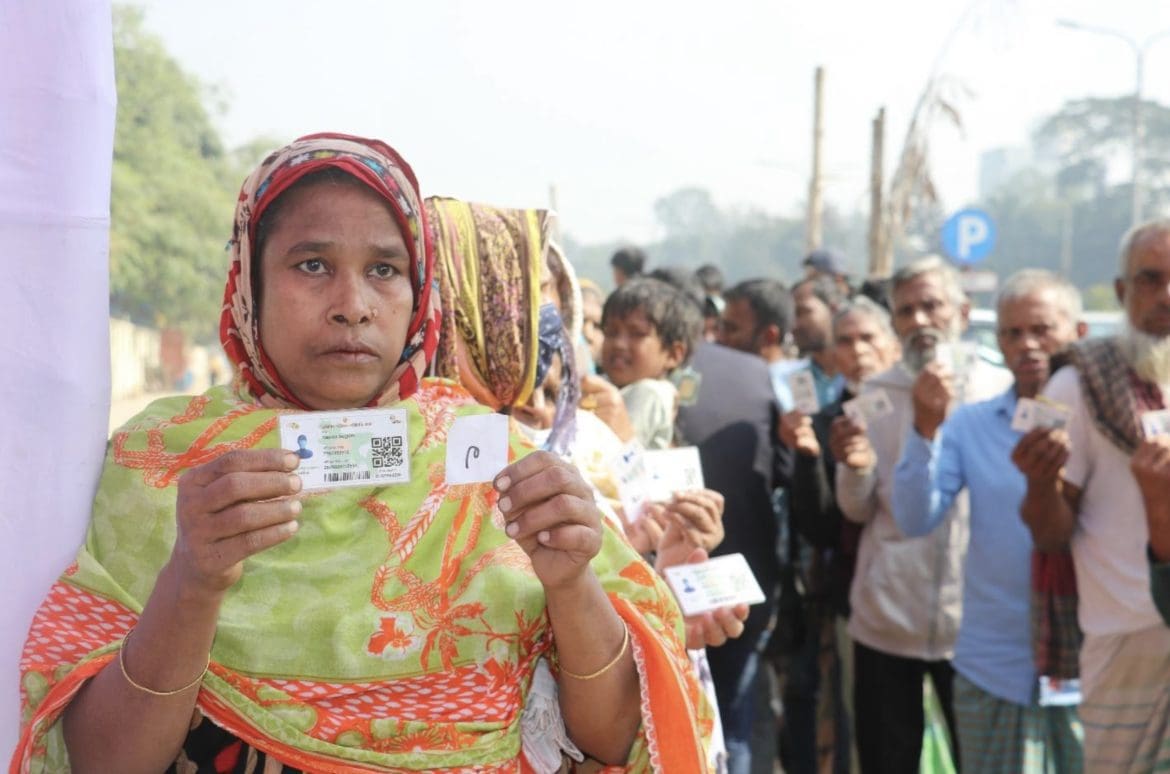KEY TAKEAWAYS
- The COVID-19 pandemic, followed by the Russian invasion of Ukraine, caused massive supply chain disruptions which resulted into a global food and energy crisis.
- But after the pandemic the aggregate supply of food products failed to adjust with the growing aggregate demand which resulted into the erosion of currency’s value and inflation.
- Heavy reliance on food imports & energy imports, climate change, natural disasters, and a distorted market mechanism pose significant threats to Bangladesh’s national food security.
- In times of crunch, TCB’s relief played a pivotal role in addressing all these challenges and reducing the sufferings of the low and middle income groups by providing them access to food products at a relatively lower cost.
- Though TCB’s accomplishments are commendable, the government needs to consider possible areas of interventions to achieve food security in Bangladesh by strengthening TCB’s operations and looking for other sustainable alternatives.
Bangladesh, with a population of more than 165 million people, has made significant advances in its battle against chronic hunger and malnutrition. A 2015 United Nations report on global hunger highlighted Bangladesh for being successful in reducing chronic hunger by more than half since 2000. However, the COVID-19 pandemic, followed by the Russian invasion of Ukraine, caused massive supply chain disruptions which resulted into a global food and energy crisis. According to the Global Report on Food Crisis 2022, around 193 million people in 53 nations and territories are experiencing food insecurity.
When things started to recover after the pandemic, the aggregate demand for food products shot up whereas the supply side of the market failed to adjust with the growing demand. Due to low aggregate supply in the market, the prices spiked which caused high inflation. As a result, the value of money eroded and real income of people fell down. Even though Bangladesh has been successful in domestically producing most of its essential food products, still it relies on other countries for rice, wheat, pulse, edible oils, milk products etc. When the supply chain was disrupted, freight and other costs rose dramatically that directly affected the poor consumers. Especially, when natural gas prices increased due to sanctions on Russia, it increased the global food & energy prices and made it expensive to continue food and fertilizer production domestically.
Bangladesh is also vulnerable to weather uncertainties due to climate change. In late October 2022, the Cyclone Sitrang destroyed 33,000 hectares of transplanted Aman paddy crop and washed away fish and shrimps primarily in the southern coastal part of Bangladesh. Land degradation, river erosion, dry weather – all of these pose significant threats to the nation’s food security.
On the other hand, the market mechanism of the country is greatly distorted due to the hoarding and other market manipulation practices of unscrupulous traders and businesspeople which exacerbates the food crisis. The syndication has created a huge discrepancy in retail and wholesale market prices that woe the low and middle income consumers significantly.
According to Nobel laureates Abhijit Banerjee and Esther Duflo, food spending accounts for a significant share of the budgets of poor households in developing countries. Hence, socioeconomic welfare of poor households in developing nations is highly sensitive to food prices.
 To reduce the sufferings of the low and middle income groups of Bangladesh, the Government of Bangladesh (GoB) heavily subsidizes essential food items through the Trading Corporation of Bangladesh (TCB). During the holy month of Ramadan, around 10 million families across the country are receiving five essential items (sugar, dates, edible oil, chickpeas, and lentil) at subsidised rates. Where the current sugar price in the market is around Tk. 112 per kg, TCB will sell sugar at Tk. 60 per kg. This Tk. 62 reduction in price makes sugar more accessible to the low and middle income households. Under this operation, the price of per kg lentil is Tk 70, per kg chickpeas is Tk 50, per liter soya bean oil is Tk 110 and per kg dates is Tk 100.
To reduce the sufferings of the low and middle income groups of Bangladesh, the Government of Bangladesh (GoB) heavily subsidizes essential food items through the Trading Corporation of Bangladesh (TCB). During the holy month of Ramadan, around 10 million families across the country are receiving five essential items (sugar, dates, edible oil, chickpeas, and lentil) at subsidised rates. Where the current sugar price in the market is around Tk. 112 per kg, TCB will sell sugar at Tk. 60 per kg. This Tk. 62 reduction in price makes sugar more accessible to the low and middle income households. Under this operation, the price of per kg lentil is Tk 70, per kg chickpeas is Tk 50, per liter soya bean oil is Tk 110 and per kg dates is Tk 100.
In order to ensure access to food and nutritious diet for the low and middle income households, TCB has taken the following large steps in recent times:
- During the pandemic (FY 2019-20) commodities were sold through 36,107 trucks benefitting around 59.4 million people.
- In order to increase the capacity of stockpiling and stabilize the market prices by controlling supply, the current government has increased the warehouse capacity of TCB. In FY 2008-09, TCB had only 9,560 MT warehousing capacity. Now, a 40,000 square feet warehouse has been established in Chattogram. Currently, TCB’s warehousing capacity is 14,354 MT.
- To further the campaign “My Village, My Town”, TCB signed contracts with almost 3,330 dealers to provide food to the rural areas of the country.
- To better target the rural poor, TCB has set up 4 new camp offices at Cumilla, Madaripur, Jhenaidah, and Bogura in 2020. Additionally, 4 new regional offices were established in Rangpur, Barisal, Mymensingh, and Moulvibazar to expand TCB’s operation to the remotest areas. More than 700 new dealers have been appointed down to Upazila level to efficiently target the most vulnerable rural households.
- TCB has played a pivotal role in controlling the onion price in the market which ascended due to a shortage of onions in the international market in 2019.
- Besides truck and store selling channels, TCB forged partnerships with e-commerce sites such as Chaldal, Sindabad, Sabzibazar, Shwapno to sell onions online. TCB and e-Commerce Association of Bangladesh (e-Cab) have jointly launched an initiative called “Get Onions Comfortably at Home.”
- Since targeting the vulnerable families is an extremely erroneous and difficult task, TCB has introduced family cards to aid the process.
This consumer-oriented food subsidy through TCB aims to establish a welfare state by ensuring healthier children, and more productive adults. The program has the potential to reduce the socioeconomic inequality of diet. TCB’s operations are therefore critical in two ways to deal with the ongoing supply chain, food and energy crisis-
First, it’s extremely difficult to mitigate the ongoing supply chain disruptions. Most of the factors influencing the current crisis are beyond the control of Bangladeshi people and their government. It’s highly probable that the energy and food crisis along with the inflationary pressure will continue for, at least, the foreseeable future.
Because the current price spike is supply-driven, any massive changes in the monetary policy may not showcase desired effects. Hence, the best way to ease the lives of the low and middle income population of Bangladesh is to adjust the fiscal policy by increasing government spending on food subsidies.
Second, certainly, all the governments in Bangladesh’s history share the failures of not being able to create an immune system to global crises, not diversifying the energy basket and not becoming completely food self-sufficient. However, these reformations have to be done in the long-term. Most of these changes cannot be made right away. But the real question is should we wait for long-term changes when a huge number of people in our country are deprived of their basic right to food. Thus, even though there is a skepticism regarding the sustainability of such food subsidies globally, GoB has to spend in food subsidies through TCB to protect the most vulnerable groups of the country.
Though TCB’s accomplishments are commendable, the GoB has to consider the following EIGHT recommendations or possible areas of intervention to achieve food security for its people-
- TCB has to deploy a stringent policy to monitor and regulate illegal practices of its dealers. All the dealers must be held accountable if any malice practices are found. In 2020, TCB scrapped license of 700 dealers for breaching rules. Such actions must continue even during a crisis.
- TCB’s truck and store-based sales should be expanded across the nation and specifically target the individuals who need this service the most.
- TCB must conduct an assessment to estimate the demand and supply size of essential commodities – the maximum and minimum resource requirements. Additionally, TCB can utilize their experience in dealing with crises such as COVID, Russia-Ukraine War and prepare for future challenges. This will allow TCB to procure commodities beforehand and intervene in the market at the right time. The government needs to create an updated database to identify the needs of essential commodities.
- Many individuals who do not deserve the subsidies may receive it through unfair means. The government needs to deploy some form of means-testing to effectively target the individuals who need these food subsidies the most. In order to efficiently target the most vulnerable, the government can collaborate with pertinent associations. Garments workers require special attention from GoB since they are experiencing difficulty in making the ends meet. The government can enter into a contract with the RMG owners’ association to launch their ration cards. This approach significantly reduces the burden from the shoulders of the government. At the factory level, the government can set a ceiling that workers or employees under a certain threshold will get a card to purchase their necessities. If goodwill is shown from factory owners, TCB can open its outlets or park their trucks near the factories to provide its services.
- TCB’s food grain management system also has to be improved. In March 2023, fire broke out at a warehouse of TCB in Tejgaon, Dhaka damaging about 20 tonnes of soybean oil and 10 tonnes of chickpeas. Authorities need to ensure such accidents do not occur frequently and if any such adverse situations arise, they need to be prepared to protect the stocks and workers. Additionally, wastages have to be minimized.
- GoB needs to look for other efficient subsidy programs like “Food for Education” program for the long run. In the 1990s, Bangladesh was a pioneer in this area of social safety-net development with the help of US foreign aid by providing cash or food vouchers to families that promised to send their kids to school.
- If GoB deems financially plausible, it can expand its direct cash transfers under social safety net programs in the next budget.
- The Bangladesh Competition Commission, Directorate of National Consumer Rights Protection, and Bangladesh Food Safety Authority need to effectively monitor and regulate the market so that any artificial food shortages and other issues can be addressed and resolved.
About the Author

Shah Adaan Uzzaman is the Blog Administrator at The Confluence. A former Bangladesh Television Debate Champion and winner of several policy & debate competitions, he is currently a student of IBA, University of Dhaka.

1 comment
[…] Security through Tech Macron’s Historic Bangladesh Visit and France’s “Third Way” TCB’s Relief in Times of Crunch Celebration of Soil and […]